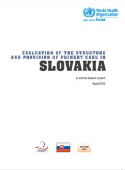Evaluation of the structure and provision of primary care in Slovakia

Download
2012
Health reforms are part of the profound and comprehensive changes in essential societal functions and values occurring in many eastern European countries in economic and political transition. Primary care reform is not always evidence based and may be driven by political arguments or the interests of specific professional groups. However, policy-makers and health care managers now increasingly demand evidence of the effects of reforms and the responsiveness of services.
The WHO Primary Care Evaluation Tool (PCET) aims to provide a structured approach to evaluation. It focuses on health systems functions, such as governance, financing and resource generation, and the characteristics of a good primary care service delivery system, which include accessibility, comprehensiveness, coordination and continuity. This report provides an overview of findings from the use of PCET in Slovakia.
The project was carried out in 2010 as part of the 2010/2011 biennial collaborative agreement between the WHO Regional Office for Europe and the Ministry of Health of Slovakia, an agreement that lays out the main areas of collaborative work. It also involved the Netherlands Institute for Health Services Research (NIVEL) – a WHO collaborating centre for primary care – Agency NOVUM PRO and other stakeholders in the Slovak health system, including national policy experts, managers, medical educators, primary care physicians and patients.



